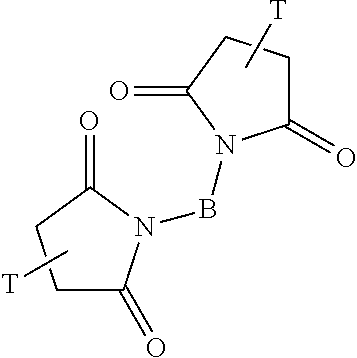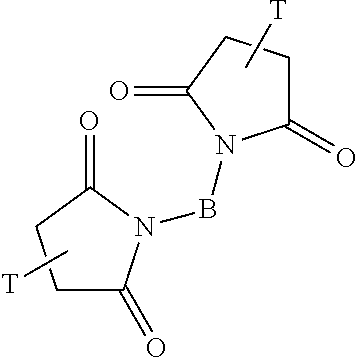Thermoplastic Composition
a technology of thermoplastics and compositions, applied in the field of thermoplastic compositions, can solve the problems of less efficient processing in expensive and increase production costs, and achieve the effects of less efficient processing, increased production costs, and reduced filtering
- Summary
- Abstract
- Description
- Claims
- Application Information
AI Technical Summary
Benefits of technology
Problems solved by technology
Method used
Image
Examples
examples
[0071]Melt 1 (MELT1): Ethylene-bis-stearamide (37 parts) (commercially from Aldrich) is melt mixed with polypropylene (20 parts, ex Aldrich weight average molecular weight (MW) 14,000) and polyethylene (43 parts, ex Aldrich, medium density).
[0072]Example 1 (EX1): Polyisobutylene succinic anhydride (with polyisobutylene having a number average molecular weight of 950) 148.2 g is charged to a 250 ml 3 neck round bottom flask and stirred at 70° C. under a nitrogen atmosphere. Ethylene diamine (4.45 g) is added slowly dropwise to the stirred liquid. An exotherm resulted and the temperature is allowed to cool back to 70° C. and held at this temperature for 3 hours. The temperature is then raised to 180° C. for 24 hours and a brown viscous liquid (135.2 g) is obtained with an acid value of 10.5 mg KOH / g.
[0073]Melt 2 (MELT2): The product of EX1 (37 parts) is melt mixed with polypropylene (20 parts, ex Aldrich weight average molecular weight (MW) 14,000) and polyethylene (43 parts, ex Aldri...
PUM
| Property | Measurement | Unit |
|---|---|---|
| wt. % | aaaaa | aaaaa |
| particle size fraction | aaaaa | aaaaa |
| particle size fraction | aaaaa | aaaaa |
Abstract
Description
Claims
Application Information
 Login to View More
Login to View More - R&D
- Intellectual Property
- Life Sciences
- Materials
- Tech Scout
- Unparalleled Data Quality
- Higher Quality Content
- 60% Fewer Hallucinations
Browse by: Latest US Patents, China's latest patents, Technical Efficacy Thesaurus, Application Domain, Technology Topic, Popular Technical Reports.
© 2025 PatSnap. All rights reserved.Legal|Privacy policy|Modern Slavery Act Transparency Statement|Sitemap|About US| Contact US: help@patsnap.com


